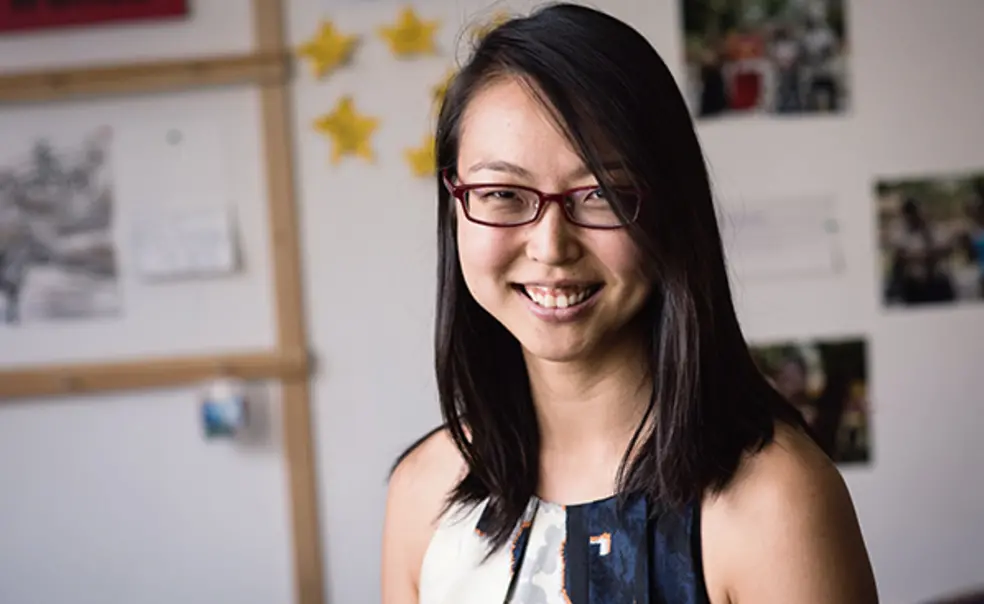With Zeal for Service, Jane Yang ’11 Helps Farmers in East Africa
Jane Yang ’11 has always felt fortunate to be born in the United States. For one thing, if her parents hadn’t uprooted their lives in China, where there was a one-child policy at the time, and moved to Ypsilanti, Mich., Yang wouldn’t be alive.
As if to repay the world for their good fortune, Yang and her older sister Lin decided early on to devote two hours at least three times a week to community service. They founded a chapter of Key Club — the high school version of Kiwanis — at their school and set about organizing volunteer opportunities for themselves and their classmates. The activities ranged from Salvation Army bell-ringing to tutoring math and reading at a local elementary school. “Some people play a lot of sports,” says Lin Yang. “Community service was kind of our sport.”
The Yang parents didn’t quite understand their daughters’ zeal for community service on such a large scale. Of course, there was that elderly neighbor of theirs who couldn’t drive. Yang’s mother, a doctor, would go out of her way to take him grocery shopping every weekend and Yang’s older sister was tasked with helping him cook.
“Part of the reason I’m interested in civic engagement and social impact is because of my parents,” says Yang, whose parents allowed the community service hobby to persist, despite worries that the girls weren’t spending enough time on their studies. They needn’t have worried. Lin Yang attended Georgetown University and in 2007, her younger sister was admitted to Princeton.
At Princeton, Yang pursued chemical engineering, which she felt would allow her to impact the most people by taking discoveries made in the lab and bringing them to the masses. But it was a hard row to hoe, especially with Yang’s Integrated Science classes, which attracted the most motivated students. On the outside, the six-foot tall Yang, who favors bright colors, projected “panache,” remembers her Integrated Science classmate Mohit Agrawal ’11. On the inside, however, Yang felt overwhelmed. She considered transferring.
Then she volunteered for Princeton Engineering Education for Kids (PEEK), visiting local elementary schools to teach children the basics of engineering using LEGO Mindstorms robotics kits. She was good at it. The student leader at the time, Doug Eshleman ’10, asked Yang to be a co-leader. “I doubt he realized how much it meant to me,” says Yang, who suddenly felt she could “dig a little deeper.”
Community service was more than just a hobby, she realized. It was her life’s work. The next year, Yang became co-president of Engineers Without Borders and traveled to Ghana, where the group began building a library in an urban slum. (The library continues to operate today.)
After graduation, Yang’s parents urged her to settle down and take the consulting job she had been offered. Instead, she deferred the offer to become a Princeton in Africa Fellow with the International Rescue Committee in Nairobi, Kenya.
When she returned a year later to finally start her job as a strategy and operations consultant for Deloitte in Washington, D.C., Yang felt vaguely unsatisfied. “At the end of the day, the scales didn’t balance to help others rather than me,” she says.
Two years later, she broke the news to her tight-knit group of Princeton friends during one of their regular video chats. She was going back to Nairobi to work for One Acre Fund, a nonprofit that aids farmers in East Africa through financing and training.
One of those on the call, Sarah Wellons ’11, wasn’t surprised. Her former roommate was always thinking about the well-being of others. For example, one summer, she wondered why Yang made a habit of pouring cereal in a bowl each night before going to bed. It was so she wouldn’t wake up Wellons, who was a light sleeper, Yang explained. The job at One Acre Fund, says Wellons, was a “natural fit.”
As part of her job, Yang sometimes visits One Acre Fund’s customers in rural East Africa. She especially remembers the hospitality of one proud homeowner in Burundi. The walls of the woman’s house were made of mud and the roof made of iron. Inside were a table and a bench for guests and on the ceiling were little scraps of paper that the woman had fashioned into fans as decoration. “I remember thinking when I was sitting in her house that she worked so hard and it’s too bad,” says Yang. “Talent and kindness are very evenly distributed, but opportunity is not.”












No responses yet